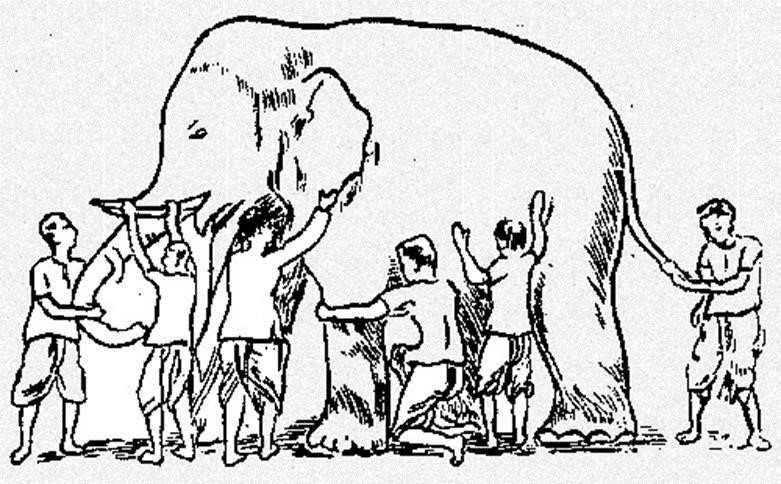3 Simple Questions You Should Occasionally Ask Yourself
While the famous Greek philosopher Socrates was strolling in a garden, contemplating life and the universe, one of his neighbors interrupted him, saying, “You won't believe what I just heard about our friend.” “Hold on a moment,” Socrates interrupted. “Before continuing your story, I want you to pass the Triple Filter Test.”
Note: This article is taken from Angel Chernoff's blog, where she talks about 3 questions that a person should ask himself from time to time.
Curious, the neighbor asked, “What is this test?” “It's the Triple Filter Test,” Socrates restated. “The first filter is Truth,” he continued. “Are you sure the story is accurate and true?”
With a “no,” the neighbor said, “I'm not sure of its accuracy. I recently heard it from an acquaintance.”
Socrates swiftly responded, “Very well. Let's move on to the second filter. Is there any Goodness in the story you intend to tell me?”
The neighbor answered, “No, quite the opposite. In fact, the story is…” Once again, Socrates interrupted, “You're about to tell me a story that you're not sure is true, and it's definitely not good.”
The neighbor agreed. Socrates continued, “You can still prove your story validation. Now, let's consider the third filter. Is there any usefulness or lesson in sharing this story?” After some thought, the neighbor replied, “No, I don't think the story…” Socrates interrupted for the final time, “You intend to tell me a story that is not True, not Good, and has no Useful purpose whatsoever.” The neighbor bowed their head, and Socrates concluded, “There's no valid reason to share such a story. It lacks logical justification for believing it in the first place.” The neighbor left, deep in thought.
3 Simple Questions You Should Occasionally Ask Yourself
Life's fundamentals haven't changed much over time, especially concerning the stories we tell ourselves and others. People often waste time exaggerating situations, spreading rumors, and indulging in unnecessary anxiety and overthinking. Many start their day scrolling social media without valid reasons, avoiding their own thoughts and escaping from responsibilities and tasks. These incentives run counter to the values articulated by Socrates: Truth, Goodness, and Usefulness.
Life offers countless opportunities to discover Truth, Goodness, and Usefulness. However, people fail to seize these opportunities without facing the consequences of their wrong actions and decisions in the short term. Over time, the consequences of carelessness and neglect begin to show up abruptly and without notice.
These heedlessness indications include a loss of control over one's life and regret over previous decisions. Therefore, beware of slipping into the heedlessness trap and remember Socrates' advice to concentrate on Truth, Goodness, and Usefulness.

Here are three quick questions you should periodically ask yourself:
1. Are the Stories You Tell Yourself True?
People create stories about their experiences and circumstances, shaping their perspectives and approaches to life. When faced with experiences, people seek evidence that confirms their stories and often reject anything that contradicts them. This tendency influences their decisions and viewpoints.
One analogy compares marital arguments and the psychological exhaustion they cause to an ancient story. In this story, some blind people touch an elephant for the first time to discover its nature and characteristics. Each person feels a different part of the elephant’s body, and when they compare their observations, they realize they describe the elephant differently. This leads to disagreements and tension among them.

Many people go through traumatic experiences in life, such as losing loved ones to tragic accidents or life-threatening illnesses, feeling betrayed, being unemployed, or experiencing racial discrimination.
These painful past experiences shape their present perspectives and decisions. They activate what psychologists call the “psychological defense mechanism.” The brain attempts to overcome the fear of the unknown and lack of information when faced with novel situations or experiences whose future outcomes are unknown and with insufficient data by recollecting well-known stories from the past. These old stories provide comfort and a sense of control over life.
People often use their past experiences and stories to fill in the gaps in their knowledge and interpret current events. While this can help them understand current circumstances, issues can arise when these stories fail to provide an accurate interpretation or are irrelevant to the current context. In such cases, people may form incorrect viewpoints and make harmful decisions, affecting both themselves and their loved ones.
Overcoming this challenge involves recognizing the stories that influence your perspectives and reactions to present experiences. Don't let these stories control your choices or behavior. Consequently, evaluate every experience impartially and without bias. Are you sure the story you’re telling yourself is True?
Consider the emotions, decisions, and behaviors influenced by this story. Then, after excluding the story’s impact, form balanced viewpoints and observations about the experience. Strive to improve your cognitive abilities and cultivate well-rounded viewpoints, enabling you to make constructive decisions and lead a healthy life despite the challenges.
2. What Goodness Can You Focus On Now?
I received the following email from a reader, which I’m sharing here with their permission:
“My 10-year-old patient will undergo a new surgical procedure due to her rare and serious type of cancer. She has already undergone 14 surgeries in the past three years, but she doesn't let her health get in the way of her positive attitude. Despite her rapidly declining health and slim prospects for recovery, I am convinced that her resilience stems from her acceptance of her circumstances and her attitude toward the illness. She lives normally, playing with other children and spending quality time with her family. She has even set smart and realistic goals for the coming year, actively working toward them. Her determination and positive outlook have inspired me to focus on the positive aspects of my own life and to form positive perspectives on what is happening to me. Conversations with this little girl have helped me realize my hurtful thoughts and appreciate the blessings I have. Now, I value the blessing of health and recognize the success and goodness in my life after spending a lot of time regretting what my life had become. I aspire for more success, prosperity, and joy without appreciating what I already have. These negative thoughts used to control my life perspective and hinder my ability to progress toward important goals.”
In life, people encounter individuals who have gone through tragedies and painful experiences. So, they realize their blessings, favors, and thoughts that prevent them from appreciating the good and blessings in their lives.
You should accept your life circumstances as they are and take the necessary steps to achieve success and progress without worrying about the outcome, fearing it, or exaggerating how difficult life is. Instead, focus on the present, work methodically step by step, and make every effort in your endeavors.
15 blessings that many people often underestimate in their lives
- Life itself.
- Sight, allowing us to see breathtaking natural landscapes.
- Hearing, enabling us to appreciate soothing sounds like ocean waves and bird songs.
- Health, the ability to walk, explore the outdoors, and bask in the warmth of the sun.
- Adequate food.
- Shelter.
- Clothing.
- Growth opportunities, overcoming tough challenges, and maturing.
- Ambition, passion, motivation, and the freedom to make decisions independently. Feeling occasional anxiety about your life, work, and family is a sign of this freedom.
- Good health, with the possibility of recovery if illness strikes.
- Friends or loved ones eagerly awaiting your presence.
- Close relationships, where cherished memories are shared.
- Clean drinking water.
- Access to the internet.
- The ability to read.
Remember, you lead a more comfortable and content life than most, but you fail to realize the blessings you have and others lack. Gratitude and acknowledging both minor and major blessings along the way are the keys to happiness.

3. What Useful Actions Can You Take Right Now?
When people focus on developing better thought processes, behaviors, and actions in everyday situations, they are more successful in reaching their goals. It’s illogical to repeat the same actions and behaviors over and over again while expecting different results.
You must take responsibility for your decisions and actions without blaming others if you encounter problems or if your efforts fail. Consider starting by changing your mindset, improving your habits, and taking control of your life. After all, the quality of your life depends on your choices and actions.
Some people struggle to stick to their decisions and follow through with the actions they commit because of their daily habits. Success in life relies on daily habits and small actions. Your habits shape your life, so until you alter your daily routine, you will not be able to advance or improve it. Success isn’t achieved overnight; it results from consistent daily habits over time.
Similarly, failure also happens gradually in the same way. Daily habits, neglecting commitments, and failing to follow through day after day eventually lead to sudden and unexpected failure. So, this failure is the consequence of little daily acts rather than a singular incident or issue.
5 destructive habits that lead to business failure when repeated:
- Neglecting reservation verification.
- Delaying essential phone calls.
- Consistently ignoring customer demands and needs.
- Avoiding updates and innovation.
- Failing to perform routine small tasks necessary for success.
This negligence and lack of commitment over time can lead to sudden business failure without warning. This abrupt failure's root cause lies in daily habits and simple actions, rather than any specific event.
Practical Exercise to Improve Time and Life Management
Consider the following practical exercise to better manage your life and time, especially if you find yourself wasting time on unproductive actions that don't advance your goals:
- Write down specific details about your present situation in life: What bothers you? Where do you feel stuck? What changes do you need to make?
- Answer sincerely: What daily habits have contributed to your current situation? Identify these habits and actions.
- Describe the changes you would like to see in your situation: What can make you happier? Which good things are important to you?
- Answer the following question: What daily habits can help you change your situation and achieve your goals?
Remember to think about the small daily steps and actions that can gradually lead you toward your goals.
In Conclusion
It’s time to break free from old habits and embark on a success and progress journey. Holding onto a comfortable lifestyle won’t help you achieve your dreams and aspirations. So, periodically ask yourself the 3 questions mentioned in the article to infuse more Truth, Goodness, and Usefulness into your life.